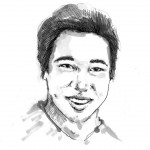Yale’s obsessed with coffee — the brown-sleeved paper cup, the warmth of Aztec mocha-spiced air, the chemical effect of a shot of caffeine. We’re even more obsessed with what coffee represents: the experience of running into a friend in line, the classic image of two friends catching up with a latte.
Our college experience boils down to these kinds of interactions: conversations at a party, in a heated seminar, over a meal, over a cup of coffee. Yale even institutionalizes community and intimate conversation; the purpose of entryways and residential colleges is to create smaller, more familiar spaces in which we can interact.
It is time that our admissions process reflects this reality.
The first Thursday after spring break, the Admissions Office will post decisions for applicants for the class of 2017. These candidates were mostly judged through four avenues: recommendations, standardized tests, grades and personal essays. Interviews, however, are optional, and “vary widely in importance,” according to Admissions Dean Jeff Brenzel. If last year’s trends hold, a little over 80 percent of admits will have had either an alumni or on-campus interview.
This is a good start — but we can do much better. We must ensure that 100 percent of our admits are interviewed, either on campus, through alumni or by phone. At this interview, they must pass what I call the Coffee Test.
The Coffee Test is simple. At the end of the interview — which is designed to be a free-flowing chat — the interviewer is asked to judge the applicant on one criterion: Is the applicant able to hold a conversation over coffee?
Our process, as it stands, primarily evaluates whether the applicant excels in the classroom. Recommendations, standardized testing, grades — these tools all measure academic prowess. The only way we attempt to learn about applicants as people is through essays, which require students to regurgitate their lives’ inflection points, intellectual revelations and moments of clarity.
But if we are honest with ourselves, we know that ink and paper cannot convey what it must be like to be an applicant’s classmate or suitemate. We have no idea how they speak, how they carry themselves — whether they are cocky or quiet, reflective or expressive. When it comes to personality, we are blindsided.
How can we claim to judge a person’s “fit” to Yale if we’ve never interacted with them in person at all?
Truth is, we cannot. Instituting the Coffee Test would require a huge increase in interviewers, but it would give the Admissions Committee an invaluable and more thorough look at a candidate’s personality.
Contrary to what some may believe, this test would not penalize introverts. The vast majority of the quieter, more reflective people at Yale would still pass. The question isn’t “how talkative are you?” — it’s “can you hold a conversation?” Yes, the most extreme introverts would likely be disadvantaged, but so would the extreme extroverts; after all, no one wants to get coffee with a person who can’t stop talking.
In fact, imposing an interview requirement would equalize the playing field. The current admissions process heavily evaluates self-expression through words on paper — hence, the personal essay. But the same process disadvantages students whose forte is expression through speech. Mandating a Coffee Test would allow applicants to demonstrate their ability in both speaking and writing, making sure that both types of expressions are valued.
I am very mindful that interviews are subjective. There is always the danger that candidates may not connect well with their particular interviewer. Some may simply not interview well. Logistically, those who cannot get an alumni or on-campus interview will have to call in by phone — which may be a little more difficult to master.
But I remain firm that understanding a candidate’s personality is worth risking a slight increase in subjectivity. The current system — where some applicants are judged on interviews while others are not — is inherently less fair than one that mandates the interview for everyone.
I don’t claim to know what qualities make a Yalie. I don’t know what high school grades, what books, what life-changing experiences make one person more qualified to attend Yale than another.
The only thing I know is what we do. Every day, on this campus, we meet each other, converse with one another and build bonds over common ground. We learn from each other as much as from the readings our professors assign.
The whole idea of the Coffee Test is to give applicants a slice of our daily life — something as mundane as talking over a cup of coffee — and see how they do. Nothing is more important than the person behind the application, and unveiling it requires much more than just pen and paper.
Geng Ngarmboonanant is a sophomore in Silliman College. Contact him at wishcha.ngarmboonanant@yale.edu .








